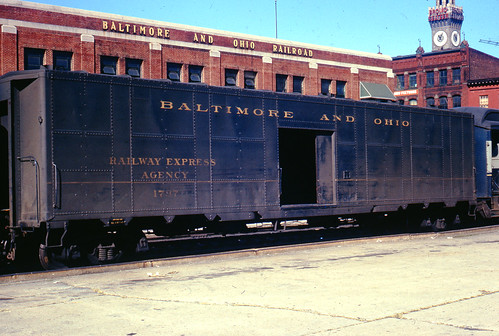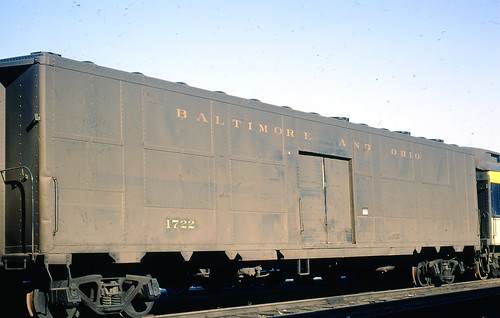
Early on while conducting research on the Georgetown Branch I came across photos of a B&O steam excursion that took place on June 6, 1948 labeled as the “MSME Excursion.” From what I can tell the train was commissioned by the Metropolitan Society of Model Engineers, a prolific and very active model railroading group in the DC area. The train was assembled at the B&O’s Eckington, DC coach yard, where it departed and traveled west on the Metropolitan Branch, to Georgetown Junction where it entered the Georgetown Branch. The train made several stops, on its way to Georgetown and then would return to Eckington, DC. The MSME itself formed at some time in the early 1930s and resided in the “attic” of Union Station where they had a permanent model railroad layout. They would host National Model Railroad conventions, local model contests, other meetings and events, including railfan excursions. For this post, I will share what I know about the train that ran that day in 1948.
So far, I have yet to uncover a detailed account of the excursion events. My assessment is based on the photos that I have discovered and that have been shared with me. From what I can tell, the train was assembled in the B&O passenger or coach yard in Ivy City. The loco, 4320, was coupled up and the train headed out, engine-first, toward Georgetown Junction. There was a stop at the Rock Creek Trestle, where some chose to photograph the loco from below as it crossed this impressive trestle.

The next stop was at Chevy Chase, MD where the train paused on its way west, just past Connecticut Ave. Note how overgrown the yard was at this time.

From here, the train continued west, passing through Bethesda and on to Dalecarlia. Whether or not the train stopped in Bethesda, I do not know. The next stop seems to have been Dalecarlia Tunnel for a photo run-by of the train emerging from the tunnel. (photo below.) The train continued down along the palisades and would next pause at Fletcher’s Boathouse along the C&O Canal. I believe the train likely backed up as patrons hiked the short distance to the bridges over the Canal where they did a run-by or simply staged a photo.

After this pause, the train then continued on to Georgetown, where it terminated near the “new yard” for a break and a photo op.

At this point, the railroad did a bit of switching of the train, changing the order from:
<<West <[4320]–[baggage]–[4602]–[C-2312]–[C-2250]–[C-1995]–[C-2806]
to:
[C-2312]–[C-2250]–[C-1995]–[C-2806]–[baggage]–[4602]–<[4320] East>>
The loco would run tender-first back up the branch, at the head end of the train. You can see the rearranged train in these images:


This last image is a really special action shot, taken from the window of caboose C-2250 as 4320 works hard to pull the excursion uphill back toward home. If I had to guess, I’d say this was in the area of Dalecarlia, but I really can’t be sure. So let’s take a look at the individual players on the train.
B&O Q1-c 4320
Built in September, 1913 by Baldwin Locomotive Works, Mikado 4320 weighed in at 284,500 lbs. The loco was retired a few years later June 19, 1951 at the Mt. Clare shops, Baltimore, MD. When the excursion happened, it was likely one of the few steamers in the area still in service and probably only used for special occasions like this. At this point diesels were really becoming ubiquitous in the DC area.

B&O REA Express Car, 17xx

Troop sleeper cars were built by Pullman during WWII to facilitate the movement of troops during the war. Afterwards, many were rebuilt into express baggage cars. Shops would cover and modify window and door openings, ends and other features to suit their needs. Unfortunately I don’t yet have a good side view of this car, so its actual number remains a mystery but is likely 17xx. Here’s a couple similar cars, found in the wonderful Barriger Library collection:
B&O Coach 4602

Joe Nevin clued me in on this car. This is a class A-13, of vintage pre-1910 construction. The car sides had steel sheathing installed over the wood siding. By WWII these cars were in excursion and special use until returned to full service during the war. By 1947, they went back into special ops (like an excursion on the Georgetown Branch).
B&O I-16 Caboose C-2312

The I-16 class was converted from old M-13 class boxcars, for use during wartime service when steel was restricted. Many railroads built composite “wartime” cabooses during this period. Car is red, with white lettering and is looking fresh!
B&O I-5 Caboose C-2250

B&O C-2250 at Eckington Yard, Washington, DC. E.L. Thompson photo, B&ORRHS collection.
I-5 subclass, constructed ca 1929.
B&O I-5 Caboose C-1995

B&O C-1995 at Eckington Yard, Washington, DC. E.L. Thompson photo, B&ORRHS collection.
I-5 subclass built ca 1926. This caboose was spotted on freights that served the Georgetown Branch.
B&O I-12 Caboose C-2806

C-2806 I-12 subclass, built in 1945, all steel construction. Red with yellow lettering.
As for modeling this train, I have begun putting together my representation. Here is the approach so far:
- Q1-c 4320: Precision Scale Q1-c. An exquisite model and really the “first” brass loco that I’ve owned. It needs a bit of work, as the mechanism is not super-smooth and it needs DCC/sound installed.
- Express Baggage Car 17xx: I found an old Roller Bearing Models – Troop Baggage Door Car kit, #501 (see pic below), but it’s completely incorrect for this car. Joe N. told me that the Walthers model is from a C&O prototype and not quite correct for the B&O (the window spacing and door placement are wrong), but I think I’m going to seek one out and use it as a stand-in for now.

- A-13 Coach 4602: To do this properly will be a challenge, as no models exist of this type of car. I have a stand-in Bachmann Spectrum heavyweight to use in the meantime.
- I-16 C-2312: So far I have collected an old Pro Custom Hobbies wood/metal I-16 kit, and an Accurail 40′ double-sheathed boxcar and some additional detail parts to do my build. The B&O Modeler magazine (Vol 7, Number 4, Pg 5) featured an article by Chris Tilley on kitbashing an I-16 which I plan to follow.

- I-5 2250 & 1995: I’m holding out for the Spring Mills Depot models, which I have faith will be coming in the future. I do have an I-5 Pacific Mountain Shops resin kit that I will build and use as a stand-in.
- I-12 2806: I have a gorgeous SMD I-12 lettered correctly which I will use.
If you have more info on this special excursion train, I’d love to hear from you! I also welcome any comments and feedback on my own observations as well as my modeling choices/plans. I have additional photos of the train, but not the permission to publicly share them, so hopefully in the future I’ll get that book written and can get them out for all to enjoy.

